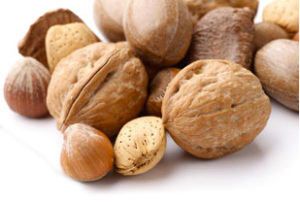 To celebrate National Nut Day, two articles about health benefits of nuts. From Medical Daily:
To celebrate National Nut Day, two articles about health benefits of nuts. From Medical Daily:
National Nut Day 2014: Peanuts, Tree Nuts, And How Each Helps Your Health
“For people who already eat plenty of meat and dairy products…nuts and ‘nutty’ legumes, like Brazil nuts, cashews, peanuts and walnuts, are a good nutritional alternative to meat,” Dr. Donal Murphy-Bokern, independent agri-environmental scientist and author of several studies on food system impacts, said in a statement. Heeding this advice means people can reap the benefits that come with eating nuts — Protein! Fiber! Omega-3 fatty acids!
Nuts fall into two categories: peanuts (which are really legumes) and tree nuts. The latter includes Brazil nuts, cashews, hazelnuts, macadamias, pecans, pine nuts, pistachios, walnuts and America’s beloved almonds. ...” And existing research generalizes that eating nuts does everything from reduce risk for a slew of diseases, maintains weight, boosts gastrointestinal and bone health, even adds years to a person’s life.
As previously mentioned, nuts are pretty much equal in terms of calories. There are, however, some nuts that have more heart-healthy nutrients and fats than others. See: pistachios. This particular tree nut is high in healthy fats called monounsaturated fats (MUFA). MUFAs are often associated with belly fat.
One study published in the journal Nutrition found that when middle-aged adults at risk for heart disease and diabetes incorporated more pistachios into their diet, they weighed less and lessened their cholesterol and blood sugar levels after just six months. And a separate study from UCLA found people who regularly ate pistachios lost an average of 10 to 12 pounds. Almonds and cashews are additional nuts high in MUFAs.
The Harvard School of Public Health reported, “several of the largest cohort studies, including the Adventist Study, the Iowa Women’s Health Study, the Nurses’ Health Study, and the Physicians’ Health Study have shown a consistent 30 percent to 50 percent lower risk of myocardial infarction, sudden cardiac death, or cardiovascular disease associated with eating nuts several times a week.”
Though almonds tend to be associated most with heart health, it’s actually walnuts that take the number one spot. ...Health reported a 2006 Spanish study, which “suggested that walnuts were as effective as olive oil at reducing inflammation and oxidation in the arteries after eating a fatty meal.”
Folate, as defined by Harvard Medical School, is “the naturally occurring form of the vitamin that is in foods or in the blood.” It’s also the vitamin that staves off brain atrophy, or the progressive loss of brain cells over time... A study published in the American Journal of Psychiatry found folate may ward off depression, too. And which nut is super rich in folate? Unsalted peanuts...peanuts are also high in vitamin E and niacin, both of which boost brain health. Hazelnuts and almonds are known to have concentrated amounts of E, too, so either nut is bound to help your noggin.
Study done in mice, but shows benefits of walnuts to brain. From Science Daily:
Fight against Alzheimer's disease: New research on walnuts
A new animal study published in the Journal of Alzheimer's Disease indicates that a diet including walnuts may have a beneficial effect in reducing the risk, delaying the onset, slowing the progression of, or preventing Alzheimer's disease. Research led by Abha Chauhan, PhD, head of the Developmental Neuroscience Laboratory at the New York State Institute for Basic Research in Developmental Disabilities (IBR), found significant improvement in learning skills, memory, reducing anxiety, and motor development in mice fed a walnut-enriched diet.
The researchers suggest that the high antioxidant content of walnuts (3.7 mmol/ounce) may have been a contributing factor in protecting the mouse brain from the degeneration typically seen in Alzheimer's disease. Oxidative stress and inflammation are prominent features in this disease, which affects more than five million Americans.
Walnuts have other nutritional benefits as they contain numerous vitamins and minerals and are the only nut that contains a significant source of alpha-linolenic acid (ALA) (2.5 grams per ounce), an omega-3 fatty acid with heart and brain-health benefits. The researchers also suggest that ALA may have played a role in improving the behavioral symptoms seen in the study.


 Nice summary article about the known benefits of nuts and seeds, and the nutrients they contain. Bottom line: all nuts and seeds are beneficial to health. It's best to eat a variety of nuts, and eat some nuts daily or at least a few times a week. A typical serving is 1/4 cup or small handful of nuts. Go to the article for the complete nut and seed list and a nut and seed nutrient chart. From Today's Dietician:
Nice summary article about the known benefits of nuts and seeds, and the nutrients they contain. Bottom line: all nuts and seeds are beneficial to health. It's best to eat a variety of nuts, and eat some nuts daily or at least a few times a week. A typical serving is 1/4 cup or small handful of nuts. Go to the article for the complete nut and seed list and a nut and seed nutrient chart. From Today's Dietician: